冀教版 八年级上 Unit 1 Me and My Class. 课件 (共135张PPT)
文档属性
| 名称 | 冀教版 八年级上 Unit 1 Me and My Class. 课件 (共135张PPT) | 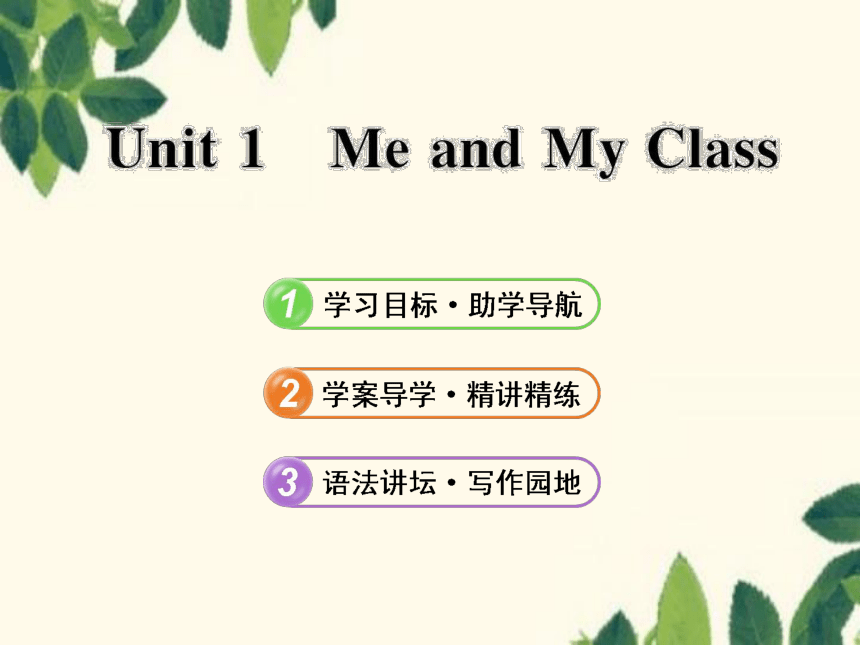 | |
| 格式 | ppt | ||
| 文件大小 | 1.4MB | ||
| 资源类型 | 教案 | ||
| 版本资源 | 冀教版 | ||
| 科目 | 英语 | ||
| 更新时间 | 2022-07-19 12:44:59 | ||
图片预览

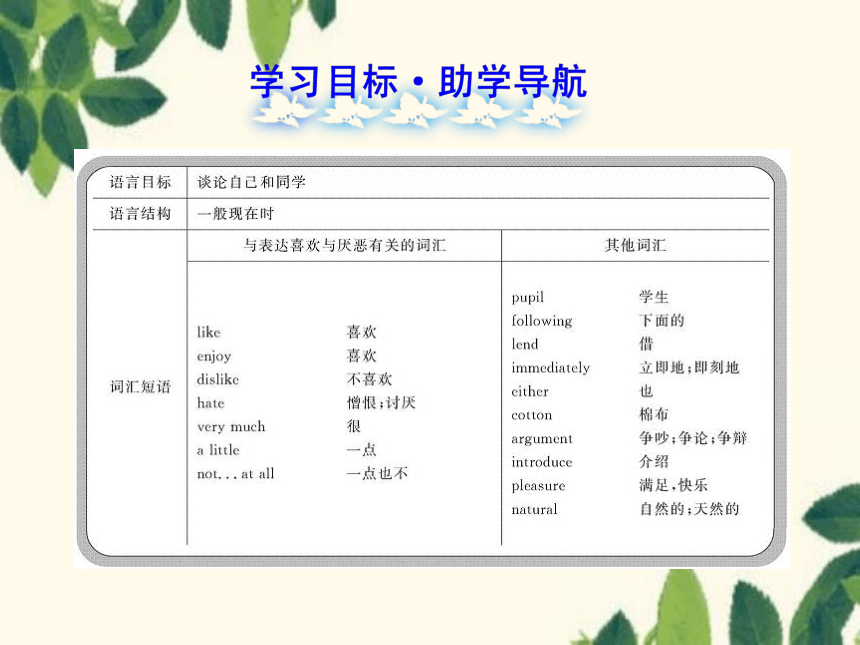
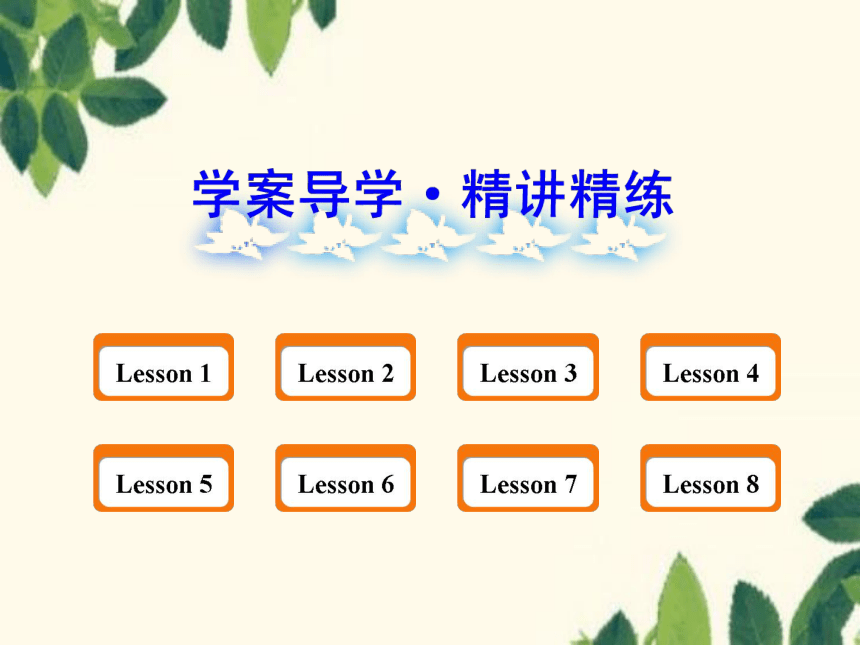
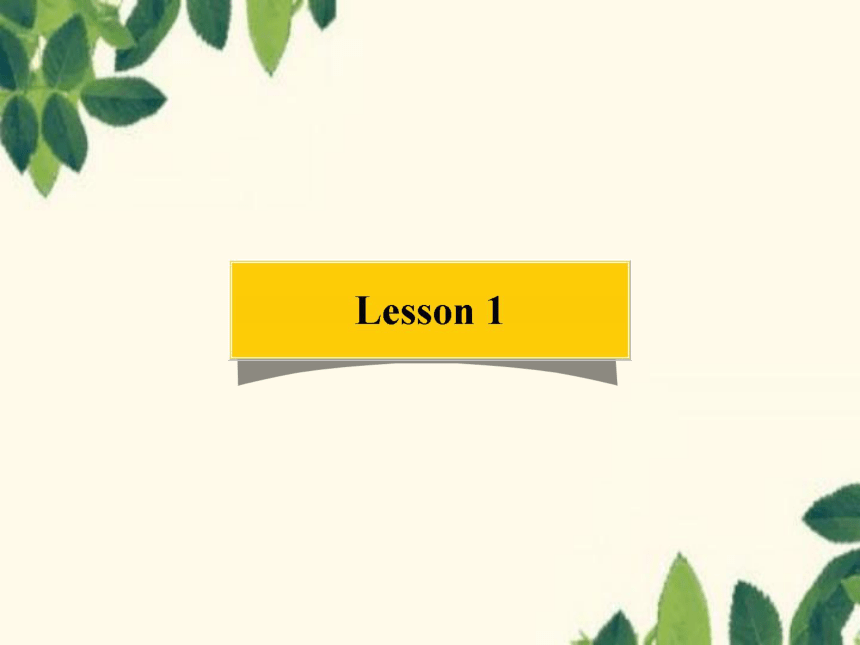
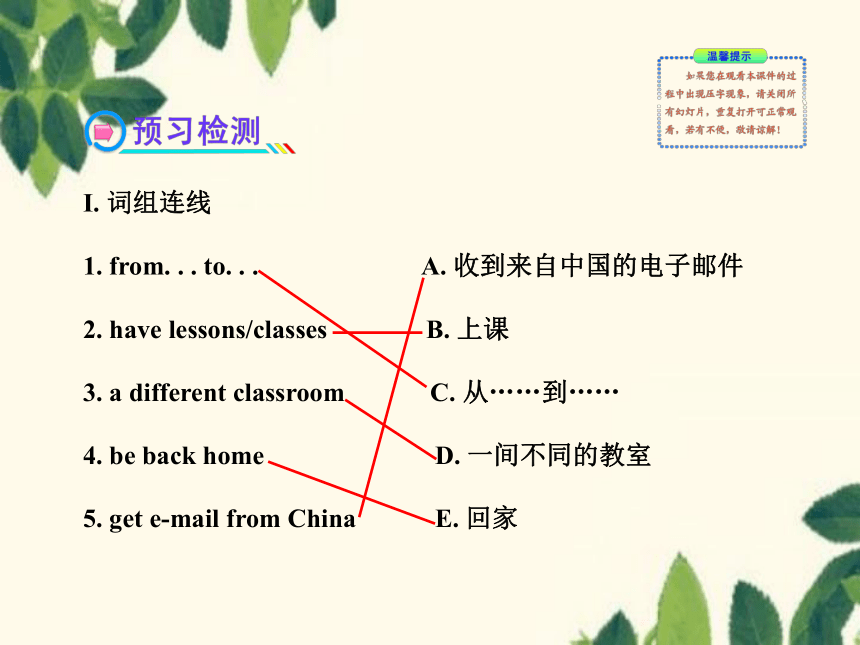
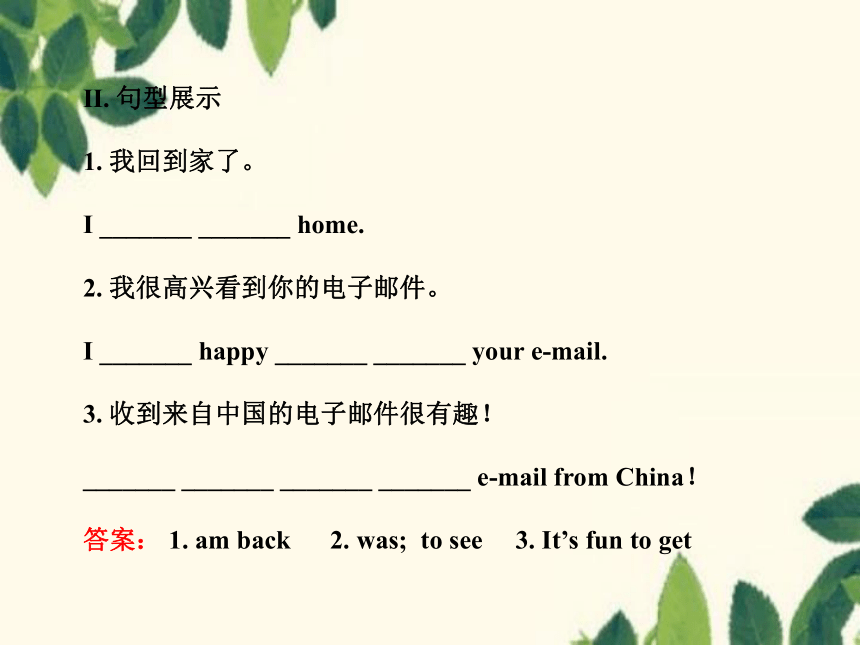

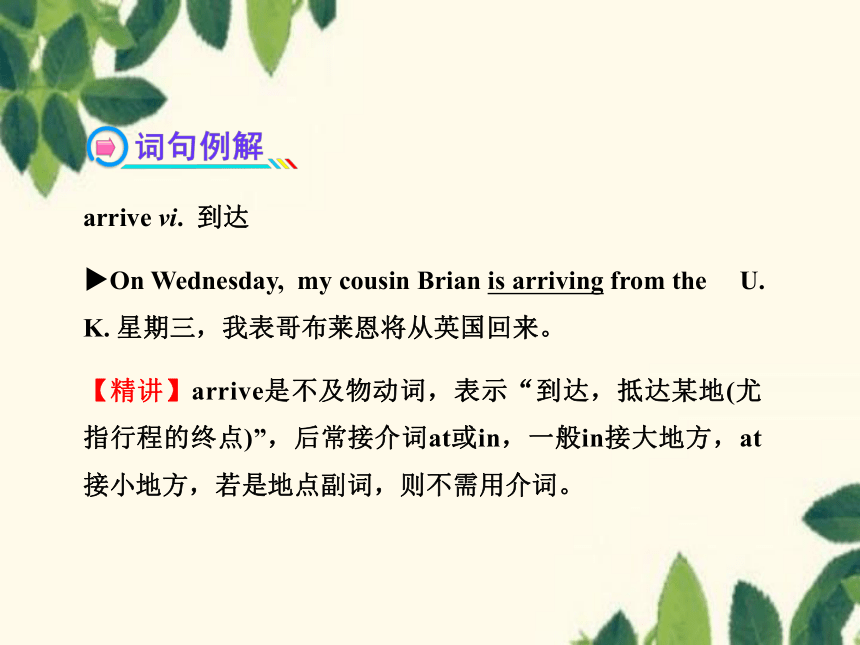
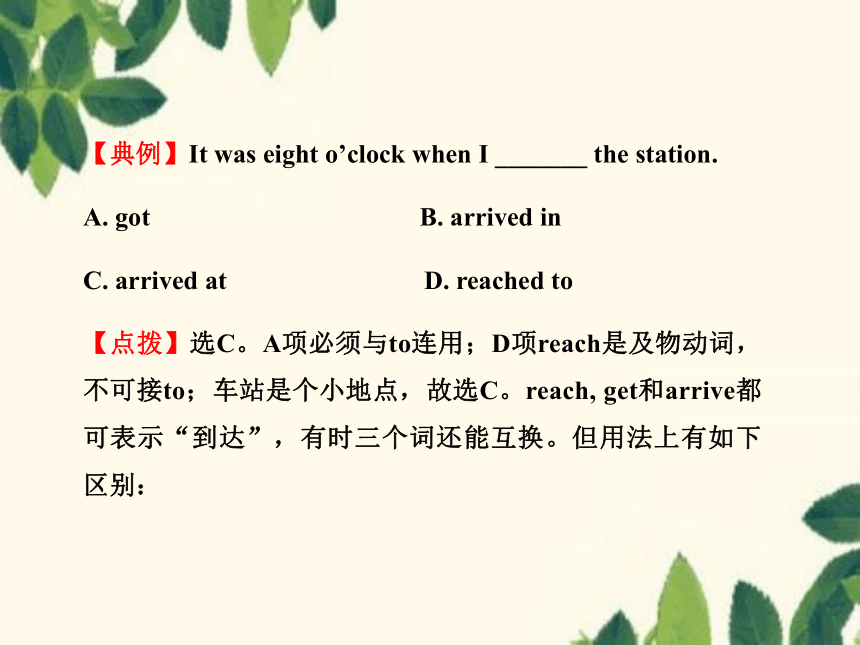
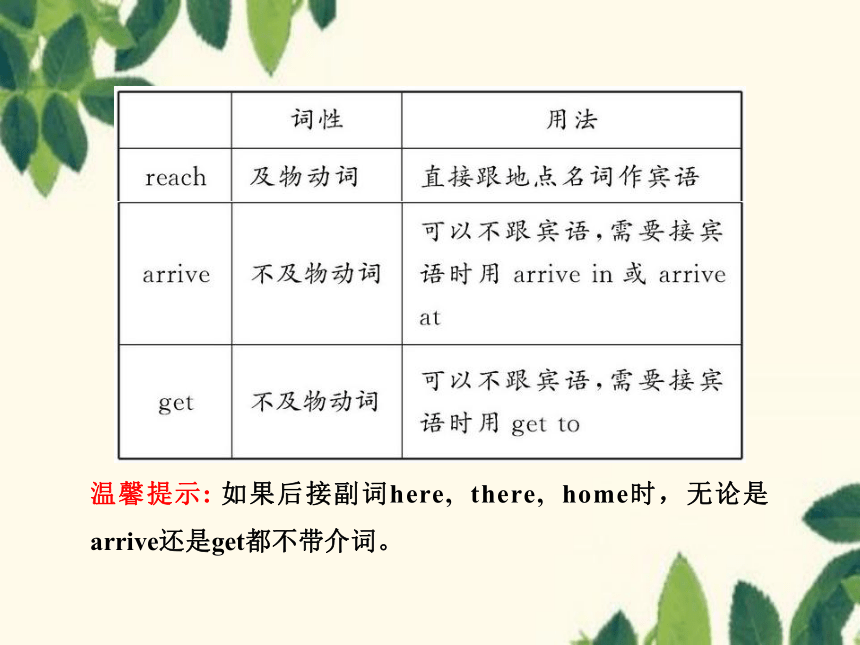
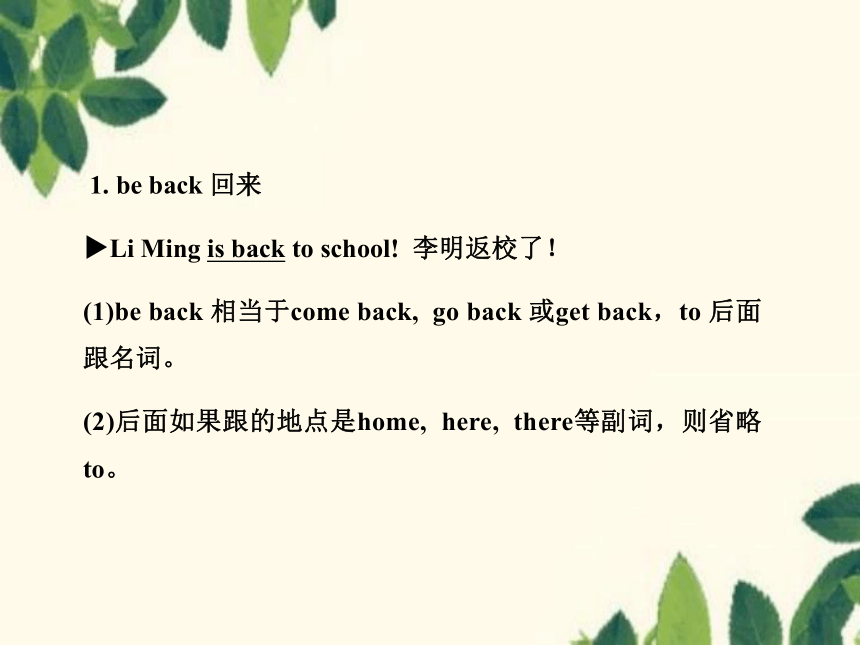
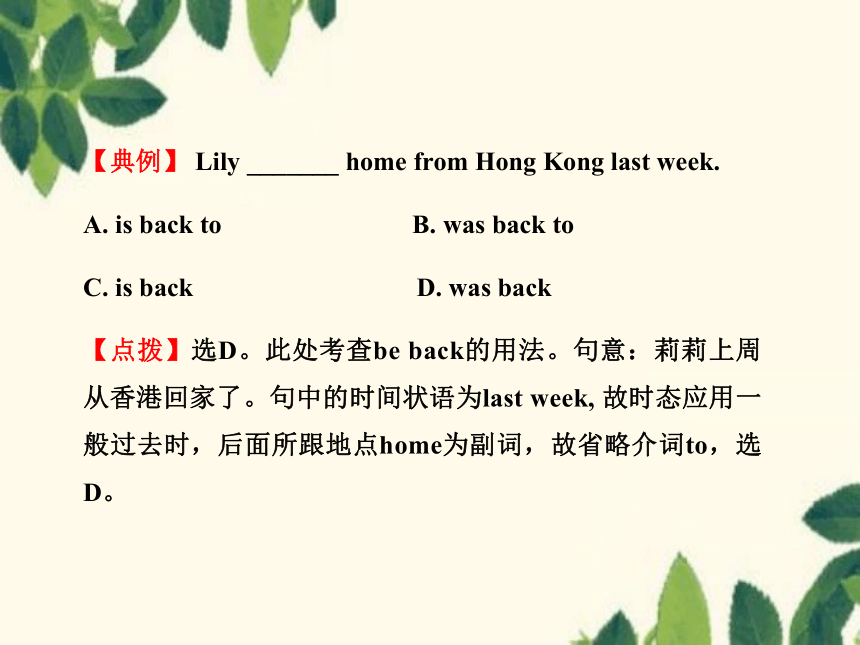
文档简介
(共135张PPT)
Ⅰ. 词组连线
1. from. . . to. . . A. 收到来自中国的电子邮件
2. have lessons/classes B. 上课
3. a different classroom C. 从……到……
4. be back home D. 一间不同的教室
5. get e-mail from China E. 回家
Ⅱ. 句型展示
1. 我回到家了。
I _______ _______ home.
2. 我很高兴看到你的电子邮件。
I _______ happy _______ _______ your e-mail.
3. 收到来自中国的电子邮件很有趣!
_______ _______ _______ _______ e-mail from China!
答案: 1. am back 2. was; to see 3. It’s fun to get
4. 对我们来讲, 这是很好的锻炼。
______ good ______ ______ us.
5. 布莱恩13岁了,就像我一样!
Brian is thirteen years old, ______ _______ me!
答案: 4. It’s; exercise for 5. just like
arrive vi. 到达
On Wednesday, my cousin Brian is arriving from the U. K. 星期三,我表哥布莱恩将从英国回来。
【精讲】arrive是不及物动词,表示“到达,抵达某地(尤指行程的终点)”,后常接介词at或in,一般in接大地方,at接小地方,若是地点副词,则不需用介词。
【典例】It was eight o’clock when I _______ the station.
A. got B. arrived in
C. arrived at D. reached to
【点拨】选C。A项必须与to连用;D项reach是及物动词,不可接to;车站是个小地点,故选C。reach, get和arrive都可表示“到达”,有时三个词还能互换。但用法上有如下区别:
温馨提示: 如果后接副词here, there, home时,无论是arrive还是get都不带介词。
1. be back 回来
Li Ming is back to school! 李明返校了!
(1)be back 相当于come back, go back 或get back,to 后面跟名词。
(2)后面如果跟的地点是home, here, there等副词,则省略to。
【典例】 Lily _______ home from Hong Kong last week.
A. is back to B. was back to
C. is back D. was back
【点拨】选D。此处考查be back的用法。句意:莉莉上周从香港回家了。句中的时间状语为last week, 故时态应用一般过去时,后面所跟地点home为副词,故省略介词to,选D。
2. It’s fun to get e-mail from China! 收到来自中国的电子邮件很有意思!
【精讲】此句型结构是:It + be + 名词/形容词+不定式。It在句中作形式主语,真正的主语为句中的动词不定式。
【典例】It’s fun _______ football.
A. play B. playing
C. to play D. plays
【点拨】选C。It is +adj. + to do sth. 是固定句型。
Ⅰ. 单项选择(5分钟,10分)
( )1. —Can H1N1(甲型H1N1流感)spread(传播) _______ person _______ person
—Yes,it can.
A. from;to B. from;from
C. to;from D. to;to
( )2. Today I’m very happy because it’s _______ day of work.
A. first B. the my first
C. my the first D. my first
( )3. Wang Mei is in _______ this year.
A. Grade 8; Class 4 B. class 4; grade 8
C. Class four; Grade eight D. Class Four; Grade Eight
( )4. There are _______ pupils in our school than in your school.
A. many B. much
C. more D. most
( )5. My mother will come back _______ home soon.
A. to B. / C. at D. in
Ⅱ. 完成句子(5分钟, 10分)
1. 我们周末不上课。
We ______ ______ ______ on weekends.
2. 这学期马老师教我们英语。
Miss Ma ______ us English ______ ______ .
答案:1. don’t have lessons/classes 2. teaches; this term
3. 九月份了,我们都回到了学校。
It’s September. We ______ all ______ ______school.
4. 对学生来说做眼保健操是很有必要的。
It’s very necessary ______ students ______ do eye ______.
5. 今年我们将有更多的乐趣。
We will ______ ______ ______ this year.
答案:3. are; back to 4. for; to; exercises
5. have more fun
Ⅰ. 英汉互译
1. 一张纸 ___________
2. 那么尴尬 ___________
答案: 1. a piece of paper 2. so embarrassed
3. a friend of. . . ____________
4. bring. . . to. . . ____________
5. look like ____________
答案:3. 一位……的朋友 4. 把……带到……
5. 看起来像
Ⅱ. 句型展示
1. 我喜欢穿我的红色外套。
I ______ ______ ______ my red coat.
2. 它是我妈妈给我的。
My mom ______ it ______ me.
答案:1. like to wear 2. got; to
3. 穿着它,我看起来像一个小男孩。
I look ______ a little boy ______ it.
4. ——你能把你的借给我吗?——当然可以。
—Can you ______ me ______
—Sure.
答案:3. like; in 4. lend; yours
1. lend v. 借;借给
Can you lend me your camera
你能把你的照相机借给我吗?
【典例】You can’t lend the books _______ others.
A. from B. to C. in D. for
【点拨】选B。句意:你不能把这些书借给别人。lend sb. sth. =lend sth. to sb. 意为“把某物借给某人”;borrow sb. sth. =borrow sth. from sb. 意为“向某人借某物”。
2. wear v. 穿; 戴
You are wearing a red coat.
你穿着一件红色的外套。
【精讲】wear “穿着”,指状态,可以用进行时,宾语除衣服、帽子外,还可以是首饰、眼镜、发饰等。例如:
He is wearing a new coat today.
今天他穿着一件新外套。
【典例】Little Jack is only 5 years old, but he could _______ himself.
A. dress B. wear C. put on D. be in
【点拨】选A。句意:小杰克只有5岁,但是他能够自己穿衣服了。此题的关键在于正确区分wear, be dressed in (be in), put on, dress等词的用法。
【图解】
Ⅰ. 单项选择(5分钟,10分)
( )1. _______ the picture. It’s very nice.
A. Look at B. See
C. Look D. Watch
( )2. Here _______ some things you can write about.
A. is B. are
C. be D. was
( )3. Wang Mei likes red. She is _______ a red coat today.
A. wear B. put on
C. wearing D. putting on
( )4. —Danny, please don’t forget to _______ your homework here tomorrow.
—OK, I won’t.
A. take B. get C. bring D. move
( )5. Are there _______ in the picture
A. a lots of trees B. any trees
C. many tree D. some trees
Ⅱ. 句型转换(5分钟,10分)
1. I’m thirteen. (改为同义句)
I’m ______ ______ ______ .
2. May I borrow your dictionary (改为同义句)
Can you ______ your dictionary ______ me
3. Wang Mei is 1. 6 metres tall. (对画线部分提问)
______ ______ is Wang Mei
答案:1. thirteen years old 2. lend; to 3. How tall
4. My mom took this picture. (对画线部分提问)
______ ______ this picture
5. Lucy and Lily look the same. (改为同义句)
Lucy ______ ______ Lily.
答案:4. Who took 5. looks like
Ⅰ. 选词配图
dinosaur, music, violin, comb
答案:1. violin 2. music 3. comb 4. dinosaur
Ⅱ. 句型展示
1. 我讨厌梳头!
I ______ ______ ______ my hair!
2. 放学后你喜欢做什么?
What do you ______ ______ ______ after school
3. 你喜欢什么食物?
What foods ______ ______ ______
答案:1. hate to comb 2. like to do 3. do you love
4. 我知道你是这儿的学生。
I ______ you’re a student _______ .
5. 我也不喜欢下雨。
I ______ like rain, _______ .
答案:4. know; here 5. don’t; either
1. either adv. 也
I don’t like rain, either. 我也不喜欢下雨。
【精讲】either 只能用于否定句中,一般放在句尾。例如:
He can’t reach the apple, and I can’t reach it, either.
他够不到那个苹果,我也够不着。
【典例】His wife ________ does the same thing.
A. also B. either C. too D. neither
【点拨】选A。also多用于肯定句中,位于行为动词之前。故选A。
2. I have one more question. 我还有一个问题。
【精讲】more用于表示数量的词和名词之间,表示“再,又”之意。这里one more相当于another。
【典例】I need _______ minutes to finish the work.
A. one more B. more five
C. five another D. a few more
【点拨】选D。 a few more minutes再几分钟。
one more = another, more的含义指在原来的基础上增加,常用于some more “更多一些”,用“基数词+ more +复数名词”表示再加几个。例如:
Would you like some more tea 再喝点茶好吗?
Please give me five more oranges. 请再给我5个橙子。
【典例】Where shall we be in _______ years
A. ten more B. more ten
C. much ten D. ten much
【点拨】选A。基数词+ more表示再增加多少,或者再过多少。
1. Getting to Know You! 逐步了解你!
【精讲】get to do往往暗示一个较长的过程,含有“渐渐开始”之意,此时get后接的不定式通常为to know, to like, to hate, to understand, to realize等表示心理感觉的动词。
【典例】The best way to _______ the city is to visit it on foot.
A. get and know B. get to know
C. get knowing D. get know
【点拨】选B。这里应该是逐步认识的意思,get to know 能表达此种意思。
2. I want you to talk to a classmate.
我想让你和一位同学交谈。
【精讲】want表示主观上的“想要,希望”,是一种有意识的行为,其后可直接跟不定式。有时表示“想要或希望做某事”,其后可接不定式的复合结构。
【典例】My father wants me _______ my mother _______ the room.
A. to help;clean B. help;clean
C. help;cleaning D. help;to clean
【点拨】选A。want sb. to do sth. 和 help sb. (to) do sth. 是两个固定句型。
3. I hate to comb my hair! 我讨厌梳头!
【精讲】hate后常接动名词或不定式,构成:hate to do sth. 或hate doing sth. 。 后接不定式,表示一次性的事或特定的某项具体活动;接动名词则表示经常性的事,表示一种倾向。例如:
She hates asking questions in the class.
她不喜欢在课堂上提问。
【典例】I hate _______ with you _______ you always smoke.
A. to drink; because of B. to drink;because
C. drinking;because D. drinking;because of
【点拨】选C。drinking动名词表示习惯性动作,because of 后面接名词,because后面接从句。
Ⅰ. 从方框中选词并用其适当形式填空(5分钟,10分)
interest,music,really,comb,violin, Miss
1. I like _______ and I can play the _______ well.
2. This is my English teacher. You can call her _______ Yang.
答案:1. music; violin 2. Miss
3. My daughter is only five years old but she can _______ her hair by herself (她自己).
4. —What’s your _______
—Playing computer games and watching TV.
5. Do you _______ hate to eat noodles
答案: 3. comb 4. interest 5. really
Ⅱ. 单项选择(5分钟, 10分)
( )1. Let me ________ .
A. write it down B. write down it
C. to write it down D. wrote it down
( )2. I don’t like to talk a lot, ________.
A. too B. to
C. either D. neither
( )3. I want my students ________ more books.
A. to read B. read C. reading D. reads
( )4. —Ding Ning is a good boy.
— ________ .
A. I think so B. I think not
C. I don’t like it D. I like it
Sweaters are made of wool. 毛衫是羊毛制成的。
【精讲】be made of 是“用……制成”的意思。
【典例】I think these coats are ________ cotton.
A. made of B. made from
C. made into D. made up of
【点拨】选A。外套可以看出原材料是棉花, 所以用be made of。
(1)be made of意为“由……制成”,指能看出制成品的原材料,发生的是物理变化。
(2)be made from意为“由……制成”,指看不出原材料,发生的是化学变化。
(3)be made in+产地(如国家、城市或厂家等)意为“在(某地)制造”。
(4)be made by+动作的执行者,意为“由(某人)制造”。
(5)材料+be made into+制成品,意为“把……做成……”。
(6)be made up of 意为“由……组成”。
1. He wears pants on a school day. . .
上学的时候,他穿着长裤……
【精讲】on a school day意为“在上学的日子里”,on表示时间时,用于表示在具体的某一天或某一天的早上、下午或晚上。如:
He met a dog on a rainy evening. 他在一个雨夜遇到一只狗。
【典例】I like to go shopping ________ weekends.
A. in B. on C. by D. with
【点拨】选B。on表示时间时,可以用于表示在具体的某一天或某一天的上午、下午或晚上。
2. Something different all year round. 一年(装束)有所不同。
【精讲】something是不定代词,different是形容词,形容词修饰不定代词时,需要放在不定代词后面。如:
He has something important to do.
他有重要的事情要做。
【典例】There is _______ with my bike.
A. something wrong B. something wrongly
C. wrong something D. wrongly something
【点拨】选A。形容词修饰不定代词时,需要放在不定代词后面。故选A。
Ⅰ. 介词填空(5分钟, 10分)
1. The sweater is made _______ wool.
2. I like wearing dresses _______ the weekend.
3. Wood can be made _______ desks.
4. This kite is made _______ Mr. Li.
5. He got up _______ six o’clock yesterday.
答案:1. of 2. on 3. into 4. by 5. at
Ⅱ. 单项选择(5分钟, 10分)
( )1. It’s warm in Hainan ________.
A. all day long B. all year round
C. all night long D. all day and all night
( )2. There is ________ with my computer. It doesn’t work.
A. nothing wrong B. anything wrong
C. wrong nothing D. something wrong
( )3. Maths _______ my favourite subject.
A. be B. is C. am D. are
( )4. Do you often read books _______ rainy days
A. in B. at C. on D. for
( )5. The bottle _______ glass.
A. is made of B. is made from
C. is made in D. is made by
句型展示
1. 但是有一天,这两个最好的朋友彼此不说话了。
But ______ ______ , the two best friends ______ ______ to each other.
2. 为什么?因为他们吵了一大架。
Why Because they ______ ______ ______ ______ .
答案:1. one day; stopped talking 2. had a big argument
3. 那样他能花费更多的时间打篮球。
That way, he could ______ more time ______ basketball.
4. 在接下来的几天里,他们两个都感到很难过。
In the ______ days, ______ ______ them felt bad.
5. 好朋友不必说对不起。
Good friends ______ ______ ______ say sorry.
答案:3. spend; playing 4. following; both of 5. don’t have to
短语连线
1. 和……吵架 A. each other
2. 相互,彼此 B. come over
3. 几个,一些 C. argue with
4. 在……的结束 D. a few
5. 走过来 E. at the end of
spend v. 花;花费
My brother spends two hours doing his homework every night. 我哥哥每天晚上花两个小时做作业。
It takes my mom half an hour to ride a bike to work every day. 妈妈每天花费半小时骑自行车去上班。
【典例】Yang Fen ________ every Saturday afternoon volunteering in an old people’s home.
A. costs B. takes
C. pays D. spends
【点拨】选D。句意:杨芬每个星期六的下午在一个老人的家里做志愿者活动。Yany Fen 作主语,动词“花费”用spend。
stop v. 停止
Stop talking! Let’s begin our class.
不要说话了,让我们上课吧!
I’m tired. Let’s stop to have a rest.
我累了,让我们停下来休息一会儿吧。
【典例】The little boy stopped _______ as soon as he saw his mom.
A. cry B. crying C. to cry D. cries
【点拨】选B。句意:那个小男孩一看到他妈妈,就停止了哭泣。stop doing sth. 停止做某事(正在做的事情);stop to do sth. 停下来去做某事(停止一件事,目的是去做另一件事)。小男孩停止了哭,故用“stop crying”。
Ⅰ. 用所给词的适当形式填空(5分钟,10分)
1. Can you answer the _______ (follow) questions
2. Mary _______ (meet) an old friend in the park yesterday.
3. —How long did you spend _______ (draw) the picture —Two hours.
答案:1. following 2. met 3. drawing
4. The students stopped ________ (play) games when the teacher came into the classroom.
5. The girl cried ________ (angry).
答案: 4. playing 5. angrily
Ⅱ. 从方框中选择恰当的短语填空 (5分钟, 10分)
a few, each other, at the end of, one day, had a big argument
1. Laura is my best friend. We often learn from _______ .
2. _______ that class, our teacher told us a story.
答案:1. each other 2. At the end of
3. Tom ________ with his sister last Sunday.
4. My brother has ________ friends at school. They often play together.
5. ________ , I found a little girl crying in the corner.
答案:3. had a big argument 4. a few 5. One day
句型展示
1. 刘老师讨厌在一月份步行去学校。
Ms. Liu ______ ______ to school in January.
2. 她不喜欢大声喧哗的人。
She ______ ______ people who talk loudly.
答案:1. hates walking 2. doesn’t like
3. 为了学英语,她去英国伦敦上大学。
______ ______ English, she went to university in London,England.
4. 现在他准备把某人介绍给全班同学。
Now he ______ ______ ______ ______ someone ______ the class.
5. 七年前她成为一名英语老师。
She ______ an English teacher seven years ______ .
答案:3. To learn 4. is ready to introduce; to
5. became; ago
选词配图
singer, Ms. , piano, England
答案:1. piano 2. England 3. singer 4. Ms.
1. be ready to do sth. 为做某事作好了准备
Now he is ready to introduce someone to the class.
现在他准备向全班同学介绍某人。
【精讲】be ready to do sth. ;be ready for sth. 与get ready for/to do sth.
We are ready to have a birthday party for her.
我们准备为她办一个生日聚会。
We are ready for the exam.
我们为考试作好了准备。
We are getting ready for the exam.
我们正在为考试作准备。
【典例】He _______ have lunch with me.
A. get ready for B. gets ready for
C. get ready to D. gets ready to
【点拨】选D。get ready to do sth. 为做某事作好了准备, 主语为第三人称单数。
2. To learn English, she went to university in London, England. 为了学习英语,她去了英国伦敦上大学。
【精讲】在这个句子中,to learn English作目的状语。动词不定式在句子中还经常可以:
①作主语: To learn English well is not easy.
②作表语: His dream is to become a doctor.
③作宾语: She wants to go shopping this afternoon.
【典例】Today we went to school _______ Mr. Liu.
A. to meet B. and meet
C. meet D. met
【点拨】选A。to meet在此处作目的状语。
finish v. 完成
Li Ming has finished his chart. 李明完成了他的图表。
【精讲】finish doing sth. 完成某事。例如:
He finished reading the book. 他读完这本书了。
【拓展归纳】类似用法的还有:
enjoy doing sth. 喜欢做某事;feel like doing sth. 想要做某事; be busy doing sth. 忙于做某事
【典例】Some boys of Class One enjoy _______ music.
A. listen to B. listens to
C. listening to D. listened to
【点拨】选C。enjoy后要接动名词。
Ⅰ. 单项选择(5分钟,10分)
( )1. Are you ready to introduce your friends _______
A. to my B. to me C. for me D. for my
( )2. When did you finish _______ your homework last night
A. doing B. do C. did D. to do
( )3. ________ is a very kind person. He is always helping others.
A. Miss Li B. Ms. Li
C. Mrs. Li D. Mr. Li
( )4. My mom ________ a doctor seven years ago.
A. become B. became
C. becoming D. becomes
( )5. —Is the woman ________
—Sorry , I don’t know.
A. marry B. marrying
C. married D. marries
Ⅱ. 句型转换(5分钟, 10分)
1. He has to go home now. (改为一般疑问句)
______ he ______ to go home now
2. He moved to Shijiazhuang two years ago. (改为否定句)
He ______ ______ to Shijiazhuang two years ago.
3. My father hates listening to music. (改为同义句)
My father ______ ______ listening to music.
答案:1. Does; have 2. didn’t move 3. doesn’t like
4. We bought some brushes in that shop. (改为否定句)
We ______ ______ ______ brushes in that shop.
5. I wanted to drink water because I was very thirsty. (对画线部分提问)
______ ______ you want to drink water
答案:4. didn’t buy any 5. Why did
Ⅰ. 词组连线
1. play soccer A. 买衣服
2. on the other team B. 九月十日
3. a good game C. 踢足球
4. September 10 D. 一场精彩的比赛
5. shop for clothes E. 在另一个队
Ⅱ. 句型展示
1. 丹尼把我们介绍给了他的新朋友桑德拉。
Danny ______ us ______ his new friend, Sandra.
2. 布莱恩和我在一个队,桑德拉和丹尼在另一个队。
Brian and I were ______ ______ ______ , and Sandra and Danny were ______ ______ ______ .
答案:1. introduced; to 2. on one team; on the other
3. 上周六,我妈妈给我买了一条牛仔裤。
Last Saturday, my mother ______ a pair of jeans ______ ______ .
4. 我和玛丽进行了一次愉快的谈话。
I had the ______ of ______ to Mary.
5. 她邀请我下个星期天去看电影了。
She ______ me ______ go to the movies with her next Sunday.
答案:3. bought; for me 4. pleasure; talking 5. invited; to
Brian and I were on one team, and Sandra and Danny were on the other. 布莱恩和我在一个队,桑德拉和丹尼在另一个队。
【精讲】表示两者中的一个如何,另一个如何,用 one. . . the other. . . 。例如:
One is light and the other is heavy. 一个轻, 另一个重。
【典例】These shoes do not match; ________ is large and ________ is small.
A. one;the other B. one;other
C. one;one D. another;the other
【点拨】选A。表示两者中的一个如何,另一个如何时,用 one. . . the other. . . 。
(1) 指单数时,若泛指用 another,若特指用the other (后接单数名词)。
(2) 指复数时,若泛指用 other (后接复数名词),若特指用 the other (后接复数名词)。
(3) others 永远表示复数意义,且其后不能再接名词,其用法大致相当于“other+复数名词”。同样的 the others 大致相当于“the other+复数名词”。
(4) another一般只能表单数,且其后接名词时也只能接单数名词。但是若其后有数词或 few 修饰时,则也可接复数名词。
(5) 与some 对比使用时, 用others (此时与some 同义)。
1. Danny introduced us to his new friend,Sandra.
丹尼向我们介绍了他的新朋友桑德拉。
【精讲】introduce表示“把……介绍给……”,常用下列结构:introduce sb. to sb. ,其中“to sb. ”也可省略。例如:
He introduced a new teacher to us at the welcome meeting. 在欢迎会上,他给我们介绍了一位新老师。
【典例】At the beginning of the class, the teacher usually says, “Let me _______ myself _______ you first. ”
A. introduce;to B. introduce;of
C. introduce;at D. introduce;for
【点拨】选A。“把……介绍给……”,常用introduce sb. to sb. 结构。
2. Last Saturday, my mother bought a pair of jeans for me. 上周六,我妈妈给我买了一条牛仔裤。
【精讲】buy接双宾语,即buy sb. sth. =buy sth. for sb. ,sb. 为间接宾语,sth. 为直接宾语。例如:
My mother bought me a present yesterday. =My mother bought a present for me yesterday.
我妈妈昨天给我买了一份礼物。
【典例】I’m going to buy a present _______ my friend Tom.
A. to B. for C. on D. about
【点拨】选B。“给某人买礼物”用buy sb. sth. / buy sth. for sb. 来表达。
Ⅰ. 从方框中选词并用其适当形式填空(5分钟, 10分)
other, others, the other, the others, another
1. She has four children. One is a teacher,and _______ are writers.
2. There are many students on the playground. Some are playing games, some are playing football, _______ are talking happily.
答案:1. the others 2. others
3. Here are two apples. One is for you, and _______ is for your brother.
4. Do you have _______ words to say
5. I don’t like this dress. Please show me _______ .
答案:3. the other 4. other 5. another
Ⅱ. 根据所给的汉语提示完成句子 (5分钟, 10分)
1. It’s _______ (多云的) now. It will rain soon.
2. Our class _______ (输) the football game yesterday.
3. He___________ (邀请我去看电影).
4. Father told me ________ (一个可笑的故事).
5. Many women love to ________ (买衣服).
答案:1. cloudy 2. lost 3. invited me to see a film
4. a funny story 5. shop for clothes
How many subjects do you have at school
你们在学校上几门课?
【精讲】how many 用来提问数量,译为“多少”。但其后接可数名词复数。例如:
How many days are there in a week 一周有几天?
how much 与how many, 二者都可以用来提问数量,译为“多少”。 但how much后接不可数名词。例如:
How much milk is there in the glass
杯子里有多少牛奶?
【典例】________ countries are there in the world
A. How much B. How old
C. How far D. How many
【点拨】选D。how many 用来提问数量,但其后接可数名词复数。
scared adj. 惊吓(惊恐;惊慌)的
Danny isn’t scared to talk to her anymore. 丹尼不再害怕和她讲话了。
【精讲】scare vt. & n. 惊吓(惊恐;惊慌), 形容词是scared。例如:
You did give me a scare. 你真吓了我一跳。
The dog scared the thief away. 狗把小偷吓走了。
【典例】The child ________ the fierce looking dog.
A. was scared to B. was scared for
C. was scared of D. was scared at
【点拨】选C。be scared of为固定短语,意为:害怕什么东西。
Ⅰ. 单项选择(3分钟,5分)
( )1. Do you enjoy _______ in China
A. living B. to live
C. live D. lives
( )2. Jack _______ to China five weeks ago and he _______ back to school tomorrow.
A. went; was B. go; come
C. went; will be D. has gone; will come
( )3. Each of the pictures here ________ different.
A. be B. are
C. is D. look
( )4. John Brown is our English teacher. We call him ________ .
A. Mr. John B. Mrs. Brown
C. Mr. Brown D. Sir John
Ⅱ. 用所给词的适当形式填空(3分钟, 5分)
1. Everything was ready. Ann _______ (feel) happy.
2. A few minutes _______ (late),it began to rain.
3. Ann bought two _______ (diary) in the shop yesterday.
4. My _______ (parent) are both teachers.
5. We _______ (go) to the movies next Sunday.
答案: 1. felt 2. later 3. diaries 4. parents
5. will go/are going
Ⅲ. 从方框中选择恰当的短语填空(4分钟, 10分)
not. . . any more, be ready to, be made of, be on, keep a diary
1. The girl does _______ like playing computer games _______ .
2. Gina and I _______ the basketball team.
答案:1. not; any more 2. are on
3. I like _______ . I write down what I do every day.
4. That shirt _______ cotton. It’s very soft and nice.
5. _______ you _______ help others
答案:3. keeping a diary 4. is made of 5. Are; ready to
一般现在时
Ⅰ. 用所给词的适当形式填空
1. Tony _______ (be) a good boy. He _______ (work) very hard.
2. The earth _______ (go) around the sun.
答案:1. is; works 2. goes
3. He often _______ (get) up early in the morning.
4. They _______ (come) from America and they _______ (be) Americans.
5. I sometimes _______ (walk) to school.
答案:3. gets 4. come; are 5. walk
一般现在时
定义:一般现在时表示经常性或习惯性的动作、现在的特征或状态、客观存在及普遍真理。
功能:
1. 表示事物或① _______ 的特征、状态。
2. 表示经常性或习惯性的② _______ 。
3. 表示客观现实。
答案:①人物 ②动作
【总结感悟】
Ⅱ. 句型转换
1. I am in Class 1, Grade 8 this year. (改为一般疑问句)
______ ______ in Class 1, Grade 8 this year
2. Li Lei can play the piano. (改为否定句)
Li Lei ______ ______the piano.
答案:1. Are you 2. can’t play
3. Mary likes English very much. (改为一般疑问句,并作肯定回答)
— ______ Mary ______ English very much
—Yes,she ______.
4. My father works in a factory. (改为否定句)
My father ______ ______ in a factory.
答案:3. Does; like; does 4. doesn’t work
5. They usually help the old man wash clothes. ( 改为一般疑问句,并作否定回答)
— ______ they usually ______ the old man wash clothes
—No, they ______ .
6. I often wash my clothes. (改为否定句)
I ______ often ______ my clothes.
7. I work on the farm. (对画线部分提问)
______ ______ you work
答案:5. Do; help; don’t 6. don’t; wash 7. Where do
一般现在时的构成
一、肯定式:1. be动词:主语+③ _______+ 其他。
2. 行为动词:主语+④ _______ +其他。
当主语为第三人称单数(he, she, it) 时,要在动词后加“-s”或“-es”。
答案:③be (am, is, are) ④行为动词
【总结感悟】
二、否定式: 其否定式是在动词原形前加do not / don’t或does not / doesn’t。主语是第三人称单数时用doesn’t,其他人称用⑤ ________ 。be动词和情态动词(can, may, must等)则在其后加⑥ ________ 构成。
答案:⑤don’t ⑥not
【总结感悟】
三、疑问式:(1) 一般疑问句的句式有:
①Do /Does +主语+⑦ _______ +其他?
②be动词/情态动词(can, may, must等)+主语+动词原形+其他?
(2) 特殊疑问句的句式:“⑧ _______ +一般疑问句”。
答案:⑦动词原形 ⑧特殊疑问词
【总结感悟】
假如你认识了一位叫Gina的美国笔友(pen pal),根据她写给你的信息向你的同学作简要介绍。必须包含所有要点,可适当增加内容,使意思更连贯。
Name:Gina
Age:14
School:Apple Tree School
Likes and dislikes:likes Chinese food and playing the guitar,hates the colour purple
Appearance(外貌):big green eyes,long blond hair,round face,small nose
【思路点拨】
此篇作文以介绍人物为话题,从人物的姓名、年龄、学校、爱好及外貌等方面对人物进行较为详细的介绍。
由此我们在写作之前要明确以下几点:
(1)文章主体是介绍人物,故时态主要用一般现在时。
(2)文章中要对人物外貌和爱好等方面进行介绍,故行文中务必注意描述人物外貌及爱好的句式应用。
【佳作欣赏】
Gina is my pen pal.She is 14 years old.She studies at Apple Tree School in America.I have a photo of her.She looks lovely.She has two big green eyes,long blond hair and a small nose.Her face is round.She likes Chinese food and goes to eat in Chinese restaurants in Chinatown sometimes.She can play the guitar very well. She is in her school’s music club.She doesn’t like purple.I don’t know why.This is my good pen pal. Do you like her
Ⅰ. 词组连线
1. from. . . to. . . A. 收到来自中国的电子邮件
2. have lessons/classes B. 上课
3. a different classroom C. 从……到……
4. be back home D. 一间不同的教室
5. get e-mail from China E. 回家
Ⅱ. 句型展示
1. 我回到家了。
I _______ _______ home.
2. 我很高兴看到你的电子邮件。
I _______ happy _______ _______ your e-mail.
3. 收到来自中国的电子邮件很有趣!
_______ _______ _______ _______ e-mail from China!
答案: 1. am back 2. was; to see 3. It’s fun to get
4. 对我们来讲, 这是很好的锻炼。
______ good ______ ______ us.
5. 布莱恩13岁了,就像我一样!
Brian is thirteen years old, ______ _______ me!
答案: 4. It’s; exercise for 5. just like
arrive vi. 到达
On Wednesday, my cousin Brian is arriving from the U. K. 星期三,我表哥布莱恩将从英国回来。
【精讲】arrive是不及物动词,表示“到达,抵达某地(尤指行程的终点)”,后常接介词at或in,一般in接大地方,at接小地方,若是地点副词,则不需用介词。
【典例】It was eight o’clock when I _______ the station.
A. got B. arrived in
C. arrived at D. reached to
【点拨】选C。A项必须与to连用;D项reach是及物动词,不可接to;车站是个小地点,故选C。reach, get和arrive都可表示“到达”,有时三个词还能互换。但用法上有如下区别:
温馨提示: 如果后接副词here, there, home时,无论是arrive还是get都不带介词。
1. be back 回来
Li Ming is back to school! 李明返校了!
(1)be back 相当于come back, go back 或get back,to 后面跟名词。
(2)后面如果跟的地点是home, here, there等副词,则省略to。
【典例】 Lily _______ home from Hong Kong last week.
A. is back to B. was back to
C. is back D. was back
【点拨】选D。此处考查be back的用法。句意:莉莉上周从香港回家了。句中的时间状语为last week, 故时态应用一般过去时,后面所跟地点home为副词,故省略介词to,选D。
2. It’s fun to get e-mail from China! 收到来自中国的电子邮件很有意思!
【精讲】此句型结构是:It + be + 名词/形容词+不定式。It在句中作形式主语,真正的主语为句中的动词不定式。
【典例】It’s fun _______ football.
A. play B. playing
C. to play D. plays
【点拨】选C。It is +adj. + to do sth. 是固定句型。
Ⅰ. 单项选择(5分钟,10分)
( )1. —Can H1N1(甲型H1N1流感)spread(传播) _______ person _______ person
—Yes,it can.
A. from;to B. from;from
C. to;from D. to;to
( )2. Today I’m very happy because it’s _______ day of work.
A. first B. the my first
C. my the first D. my first
( )3. Wang Mei is in _______ this year.
A. Grade 8; Class 4 B. class 4; grade 8
C. Class four; Grade eight D. Class Four; Grade Eight
( )4. There are _______ pupils in our school than in your school.
A. many B. much
C. more D. most
( )5. My mother will come back _______ home soon.
A. to B. / C. at D. in
Ⅱ. 完成句子(5分钟, 10分)
1. 我们周末不上课。
We ______ ______ ______ on weekends.
2. 这学期马老师教我们英语。
Miss Ma ______ us English ______ ______ .
答案:1. don’t have lessons/classes 2. teaches; this term
3. 九月份了,我们都回到了学校。
It’s September. We ______ all ______ ______school.
4. 对学生来说做眼保健操是很有必要的。
It’s very necessary ______ students ______ do eye ______.
5. 今年我们将有更多的乐趣。
We will ______ ______ ______ this year.
答案:3. are; back to 4. for; to; exercises
5. have more fun
Ⅰ. 英汉互译
1. 一张纸 ___________
2. 那么尴尬 ___________
答案: 1. a piece of paper 2. so embarrassed
3. a friend of. . . ____________
4. bring. . . to. . . ____________
5. look like ____________
答案:3. 一位……的朋友 4. 把……带到……
5. 看起来像
Ⅱ. 句型展示
1. 我喜欢穿我的红色外套。
I ______ ______ ______ my red coat.
2. 它是我妈妈给我的。
My mom ______ it ______ me.
答案:1. like to wear 2. got; to
3. 穿着它,我看起来像一个小男孩。
I look ______ a little boy ______ it.
4. ——你能把你的借给我吗?——当然可以。
—Can you ______ me ______
—Sure.
答案:3. like; in 4. lend; yours
1. lend v. 借;借给
Can you lend me your camera
你能把你的照相机借给我吗?
【典例】You can’t lend the books _______ others.
A. from B. to C. in D. for
【点拨】选B。句意:你不能把这些书借给别人。lend sb. sth. =lend sth. to sb. 意为“把某物借给某人”;borrow sb. sth. =borrow sth. from sb. 意为“向某人借某物”。
2. wear v. 穿; 戴
You are wearing a red coat.
你穿着一件红色的外套。
【精讲】wear “穿着”,指状态,可以用进行时,宾语除衣服、帽子外,还可以是首饰、眼镜、发饰等。例如:
He is wearing a new coat today.
今天他穿着一件新外套。
【典例】Little Jack is only 5 years old, but he could _______ himself.
A. dress B. wear C. put on D. be in
【点拨】选A。句意:小杰克只有5岁,但是他能够自己穿衣服了。此题的关键在于正确区分wear, be dressed in (be in), put on, dress等词的用法。
【图解】
Ⅰ. 单项选择(5分钟,10分)
( )1. _______ the picture. It’s very nice.
A. Look at B. See
C. Look D. Watch
( )2. Here _______ some things you can write about.
A. is B. are
C. be D. was
( )3. Wang Mei likes red. She is _______ a red coat today.
A. wear B. put on
C. wearing D. putting on
( )4. —Danny, please don’t forget to _______ your homework here tomorrow.
—OK, I won’t.
A. take B. get C. bring D. move
( )5. Are there _______ in the picture
A. a lots of trees B. any trees
C. many tree D. some trees
Ⅱ. 句型转换(5分钟,10分)
1. I’m thirteen. (改为同义句)
I’m ______ ______ ______ .
2. May I borrow your dictionary (改为同义句)
Can you ______ your dictionary ______ me
3. Wang Mei is 1. 6 metres tall. (对画线部分提问)
______ ______ is Wang Mei
答案:1. thirteen years old 2. lend; to 3. How tall
4. My mom took this picture. (对画线部分提问)
______ ______ this picture
5. Lucy and Lily look the same. (改为同义句)
Lucy ______ ______ Lily.
答案:4. Who took 5. looks like
Ⅰ. 选词配图
dinosaur, music, violin, comb
答案:1. violin 2. music 3. comb 4. dinosaur
Ⅱ. 句型展示
1. 我讨厌梳头!
I ______ ______ ______ my hair!
2. 放学后你喜欢做什么?
What do you ______ ______ ______ after school
3. 你喜欢什么食物?
What foods ______ ______ ______
答案:1. hate to comb 2. like to do 3. do you love
4. 我知道你是这儿的学生。
I ______ you’re a student _______ .
5. 我也不喜欢下雨。
I ______ like rain, _______ .
答案:4. know; here 5. don’t; either
1. either adv. 也
I don’t like rain, either. 我也不喜欢下雨。
【精讲】either 只能用于否定句中,一般放在句尾。例如:
He can’t reach the apple, and I can’t reach it, either.
他够不到那个苹果,我也够不着。
【典例】His wife ________ does the same thing.
A. also B. either C. too D. neither
【点拨】选A。also多用于肯定句中,位于行为动词之前。故选A。
2. I have one more question. 我还有一个问题。
【精讲】more用于表示数量的词和名词之间,表示“再,又”之意。这里one more相当于another。
【典例】I need _______ minutes to finish the work.
A. one more B. more five
C. five another D. a few more
【点拨】选D。 a few more minutes再几分钟。
one more = another, more的含义指在原来的基础上增加,常用于some more “更多一些”,用“基数词+ more +复数名词”表示再加几个。例如:
Would you like some more tea 再喝点茶好吗?
Please give me five more oranges. 请再给我5个橙子。
【典例】Where shall we be in _______ years
A. ten more B. more ten
C. much ten D. ten much
【点拨】选A。基数词+ more表示再增加多少,或者再过多少。
1. Getting to Know You! 逐步了解你!
【精讲】get to do往往暗示一个较长的过程,含有“渐渐开始”之意,此时get后接的不定式通常为to know, to like, to hate, to understand, to realize等表示心理感觉的动词。
【典例】The best way to _______ the city is to visit it on foot.
A. get and know B. get to know
C. get knowing D. get know
【点拨】选B。这里应该是逐步认识的意思,get to know 能表达此种意思。
2. I want you to talk to a classmate.
我想让你和一位同学交谈。
【精讲】want表示主观上的“想要,希望”,是一种有意识的行为,其后可直接跟不定式。有时表示“想要或希望做某事”,其后可接不定式的复合结构。
【典例】My father wants me _______ my mother _______ the room.
A. to help;clean B. help;clean
C. help;cleaning D. help;to clean
【点拨】选A。want sb. to do sth. 和 help sb. (to) do sth. 是两个固定句型。
3. I hate to comb my hair! 我讨厌梳头!
【精讲】hate后常接动名词或不定式,构成:hate to do sth. 或hate doing sth. 。 后接不定式,表示一次性的事或特定的某项具体活动;接动名词则表示经常性的事,表示一种倾向。例如:
She hates asking questions in the class.
她不喜欢在课堂上提问。
【典例】I hate _______ with you _______ you always smoke.
A. to drink; because of B. to drink;because
C. drinking;because D. drinking;because of
【点拨】选C。drinking动名词表示习惯性动作,because of 后面接名词,because后面接从句。
Ⅰ. 从方框中选词并用其适当形式填空(5分钟,10分)
interest,music,really,comb,violin, Miss
1. I like _______ and I can play the _______ well.
2. This is my English teacher. You can call her _______ Yang.
答案:1. music; violin 2. Miss
3. My daughter is only five years old but she can _______ her hair by herself (她自己).
4. —What’s your _______
—Playing computer games and watching TV.
5. Do you _______ hate to eat noodles
答案: 3. comb 4. interest 5. really
Ⅱ. 单项选择(5分钟, 10分)
( )1. Let me ________ .
A. write it down B. write down it
C. to write it down D. wrote it down
( )2. I don’t like to talk a lot, ________.
A. too B. to
C. either D. neither
( )3. I want my students ________ more books.
A. to read B. read C. reading D. reads
( )4. —Ding Ning is a good boy.
— ________ .
A. I think so B. I think not
C. I don’t like it D. I like it
Sweaters are made of wool. 毛衫是羊毛制成的。
【精讲】be made of 是“用……制成”的意思。
【典例】I think these coats are ________ cotton.
A. made of B. made from
C. made into D. made up of
【点拨】选A。外套可以看出原材料是棉花, 所以用be made of。
(1)be made of意为“由……制成”,指能看出制成品的原材料,发生的是物理变化。
(2)be made from意为“由……制成”,指看不出原材料,发生的是化学变化。
(3)be made in+产地(如国家、城市或厂家等)意为“在(某地)制造”。
(4)be made by+动作的执行者,意为“由(某人)制造”。
(5)材料+be made into+制成品,意为“把……做成……”。
(6)be made up of 意为“由……组成”。
1. He wears pants on a school day. . .
上学的时候,他穿着长裤……
【精讲】on a school day意为“在上学的日子里”,on表示时间时,用于表示在具体的某一天或某一天的早上、下午或晚上。如:
He met a dog on a rainy evening. 他在一个雨夜遇到一只狗。
【典例】I like to go shopping ________ weekends.
A. in B. on C. by D. with
【点拨】选B。on表示时间时,可以用于表示在具体的某一天或某一天的上午、下午或晚上。
2. Something different all year round. 一年(装束)有所不同。
【精讲】something是不定代词,different是形容词,形容词修饰不定代词时,需要放在不定代词后面。如:
He has something important to do.
他有重要的事情要做。
【典例】There is _______ with my bike.
A. something wrong B. something wrongly
C. wrong something D. wrongly something
【点拨】选A。形容词修饰不定代词时,需要放在不定代词后面。故选A。
Ⅰ. 介词填空(5分钟, 10分)
1. The sweater is made _______ wool.
2. I like wearing dresses _______ the weekend.
3. Wood can be made _______ desks.
4. This kite is made _______ Mr. Li.
5. He got up _______ six o’clock yesterday.
答案:1. of 2. on 3. into 4. by 5. at
Ⅱ. 单项选择(5分钟, 10分)
( )1. It’s warm in Hainan ________.
A. all day long B. all year round
C. all night long D. all day and all night
( )2. There is ________ with my computer. It doesn’t work.
A. nothing wrong B. anything wrong
C. wrong nothing D. something wrong
( )3. Maths _______ my favourite subject.
A. be B. is C. am D. are
( )4. Do you often read books _______ rainy days
A. in B. at C. on D. for
( )5. The bottle _______ glass.
A. is made of B. is made from
C. is made in D. is made by
句型展示
1. 但是有一天,这两个最好的朋友彼此不说话了。
But ______ ______ , the two best friends ______ ______ to each other.
2. 为什么?因为他们吵了一大架。
Why Because they ______ ______ ______ ______ .
答案:1. one day; stopped talking 2. had a big argument
3. 那样他能花费更多的时间打篮球。
That way, he could ______ more time ______ basketball.
4. 在接下来的几天里,他们两个都感到很难过。
In the ______ days, ______ ______ them felt bad.
5. 好朋友不必说对不起。
Good friends ______ ______ ______ say sorry.
答案:3. spend; playing 4. following; both of 5. don’t have to
短语连线
1. 和……吵架 A. each other
2. 相互,彼此 B. come over
3. 几个,一些 C. argue with
4. 在……的结束 D. a few
5. 走过来 E. at the end of
spend v. 花;花费
My brother spends two hours doing his homework every night. 我哥哥每天晚上花两个小时做作业。
It takes my mom half an hour to ride a bike to work every day. 妈妈每天花费半小时骑自行车去上班。
【典例】Yang Fen ________ every Saturday afternoon volunteering in an old people’s home.
A. costs B. takes
C. pays D. spends
【点拨】选D。句意:杨芬每个星期六的下午在一个老人的家里做志愿者活动。Yany Fen 作主语,动词“花费”用spend。
stop v. 停止
Stop talking! Let’s begin our class.
不要说话了,让我们上课吧!
I’m tired. Let’s stop to have a rest.
我累了,让我们停下来休息一会儿吧。
【典例】The little boy stopped _______ as soon as he saw his mom.
A. cry B. crying C. to cry D. cries
【点拨】选B。句意:那个小男孩一看到他妈妈,就停止了哭泣。stop doing sth. 停止做某事(正在做的事情);stop to do sth. 停下来去做某事(停止一件事,目的是去做另一件事)。小男孩停止了哭,故用“stop crying”。
Ⅰ. 用所给词的适当形式填空(5分钟,10分)
1. Can you answer the _______ (follow) questions
2. Mary _______ (meet) an old friend in the park yesterday.
3. —How long did you spend _______ (draw) the picture —Two hours.
答案:1. following 2. met 3. drawing
4. The students stopped ________ (play) games when the teacher came into the classroom.
5. The girl cried ________ (angry).
答案: 4. playing 5. angrily
Ⅱ. 从方框中选择恰当的短语填空 (5分钟, 10分)
a few, each other, at the end of, one day, had a big argument
1. Laura is my best friend. We often learn from _______ .
2. _______ that class, our teacher told us a story.
答案:1. each other 2. At the end of
3. Tom ________ with his sister last Sunday.
4. My brother has ________ friends at school. They often play together.
5. ________ , I found a little girl crying in the corner.
答案:3. had a big argument 4. a few 5. One day
句型展示
1. 刘老师讨厌在一月份步行去学校。
Ms. Liu ______ ______ to school in January.
2. 她不喜欢大声喧哗的人。
She ______ ______ people who talk loudly.
答案:1. hates walking 2. doesn’t like
3. 为了学英语,她去英国伦敦上大学。
______ ______ English, she went to university in London,England.
4. 现在他准备把某人介绍给全班同学。
Now he ______ ______ ______ ______ someone ______ the class.
5. 七年前她成为一名英语老师。
She ______ an English teacher seven years ______ .
答案:3. To learn 4. is ready to introduce; to
5. became; ago
选词配图
singer, Ms. , piano, England
答案:1. piano 2. England 3. singer 4. Ms.
1. be ready to do sth. 为做某事作好了准备
Now he is ready to introduce someone to the class.
现在他准备向全班同学介绍某人。
【精讲】be ready to do sth. ;be ready for sth. 与get ready for/to do sth.
We are ready to have a birthday party for her.
我们准备为她办一个生日聚会。
We are ready for the exam.
我们为考试作好了准备。
We are getting ready for the exam.
我们正在为考试作准备。
【典例】He _______ have lunch with me.
A. get ready for B. gets ready for
C. get ready to D. gets ready to
【点拨】选D。get ready to do sth. 为做某事作好了准备, 主语为第三人称单数。
2. To learn English, she went to university in London, England. 为了学习英语,她去了英国伦敦上大学。
【精讲】在这个句子中,to learn English作目的状语。动词不定式在句子中还经常可以:
①作主语: To learn English well is not easy.
②作表语: His dream is to become a doctor.
③作宾语: She wants to go shopping this afternoon.
【典例】Today we went to school _______ Mr. Liu.
A. to meet B. and meet
C. meet D. met
【点拨】选A。to meet在此处作目的状语。
finish v. 完成
Li Ming has finished his chart. 李明完成了他的图表。
【精讲】finish doing sth. 完成某事。例如:
He finished reading the book. 他读完这本书了。
【拓展归纳】类似用法的还有:
enjoy doing sth. 喜欢做某事;feel like doing sth. 想要做某事; be busy doing sth. 忙于做某事
【典例】Some boys of Class One enjoy _______ music.
A. listen to B. listens to
C. listening to D. listened to
【点拨】选C。enjoy后要接动名词。
Ⅰ. 单项选择(5分钟,10分)
( )1. Are you ready to introduce your friends _______
A. to my B. to me C. for me D. for my
( )2. When did you finish _______ your homework last night
A. doing B. do C. did D. to do
( )3. ________ is a very kind person. He is always helping others.
A. Miss Li B. Ms. Li
C. Mrs. Li D. Mr. Li
( )4. My mom ________ a doctor seven years ago.
A. become B. became
C. becoming D. becomes
( )5. —Is the woman ________
—Sorry , I don’t know.
A. marry B. marrying
C. married D. marries
Ⅱ. 句型转换(5分钟, 10分)
1. He has to go home now. (改为一般疑问句)
______ he ______ to go home now
2. He moved to Shijiazhuang two years ago. (改为否定句)
He ______ ______ to Shijiazhuang two years ago.
3. My father hates listening to music. (改为同义句)
My father ______ ______ listening to music.
答案:1. Does; have 2. didn’t move 3. doesn’t like
4. We bought some brushes in that shop. (改为否定句)
We ______ ______ ______ brushes in that shop.
5. I wanted to drink water because I was very thirsty. (对画线部分提问)
______ ______ you want to drink water
答案:4. didn’t buy any 5. Why did
Ⅰ. 词组连线
1. play soccer A. 买衣服
2. on the other team B. 九月十日
3. a good game C. 踢足球
4. September 10 D. 一场精彩的比赛
5. shop for clothes E. 在另一个队
Ⅱ. 句型展示
1. 丹尼把我们介绍给了他的新朋友桑德拉。
Danny ______ us ______ his new friend, Sandra.
2. 布莱恩和我在一个队,桑德拉和丹尼在另一个队。
Brian and I were ______ ______ ______ , and Sandra and Danny were ______ ______ ______ .
答案:1. introduced; to 2. on one team; on the other
3. 上周六,我妈妈给我买了一条牛仔裤。
Last Saturday, my mother ______ a pair of jeans ______ ______ .
4. 我和玛丽进行了一次愉快的谈话。
I had the ______ of ______ to Mary.
5. 她邀请我下个星期天去看电影了。
She ______ me ______ go to the movies with her next Sunday.
答案:3. bought; for me 4. pleasure; talking 5. invited; to
Brian and I were on one team, and Sandra and Danny were on the other. 布莱恩和我在一个队,桑德拉和丹尼在另一个队。
【精讲】表示两者中的一个如何,另一个如何,用 one. . . the other. . . 。例如:
One is light and the other is heavy. 一个轻, 另一个重。
【典例】These shoes do not match; ________ is large and ________ is small.
A. one;the other B. one;other
C. one;one D. another;the other
【点拨】选A。表示两者中的一个如何,另一个如何时,用 one. . . the other. . . 。
(1) 指单数时,若泛指用 another,若特指用the other (后接单数名词)。
(2) 指复数时,若泛指用 other (后接复数名词),若特指用 the other (后接复数名词)。
(3) others 永远表示复数意义,且其后不能再接名词,其用法大致相当于“other+复数名词”。同样的 the others 大致相当于“the other+复数名词”。
(4) another一般只能表单数,且其后接名词时也只能接单数名词。但是若其后有数词或 few 修饰时,则也可接复数名词。
(5) 与some 对比使用时, 用others (此时与some 同义)。
1. Danny introduced us to his new friend,Sandra.
丹尼向我们介绍了他的新朋友桑德拉。
【精讲】introduce表示“把……介绍给……”,常用下列结构:introduce sb. to sb. ,其中“to sb. ”也可省略。例如:
He introduced a new teacher to us at the welcome meeting. 在欢迎会上,他给我们介绍了一位新老师。
【典例】At the beginning of the class, the teacher usually says, “Let me _______ myself _______ you first. ”
A. introduce;to B. introduce;of
C. introduce;at D. introduce;for
【点拨】选A。“把……介绍给……”,常用introduce sb. to sb. 结构。
2. Last Saturday, my mother bought a pair of jeans for me. 上周六,我妈妈给我买了一条牛仔裤。
【精讲】buy接双宾语,即buy sb. sth. =buy sth. for sb. ,sb. 为间接宾语,sth. 为直接宾语。例如:
My mother bought me a present yesterday. =My mother bought a present for me yesterday.
我妈妈昨天给我买了一份礼物。
【典例】I’m going to buy a present _______ my friend Tom.
A. to B. for C. on D. about
【点拨】选B。“给某人买礼物”用buy sb. sth. / buy sth. for sb. 来表达。
Ⅰ. 从方框中选词并用其适当形式填空(5分钟, 10分)
other, others, the other, the others, another
1. She has four children. One is a teacher,and _______ are writers.
2. There are many students on the playground. Some are playing games, some are playing football, _______ are talking happily.
答案:1. the others 2. others
3. Here are two apples. One is for you, and _______ is for your brother.
4. Do you have _______ words to say
5. I don’t like this dress. Please show me _______ .
答案:3. the other 4. other 5. another
Ⅱ. 根据所给的汉语提示完成句子 (5分钟, 10分)
1. It’s _______ (多云的) now. It will rain soon.
2. Our class _______ (输) the football game yesterday.
3. He___________ (邀请我去看电影).
4. Father told me ________ (一个可笑的故事).
5. Many women love to ________ (买衣服).
答案:1. cloudy 2. lost 3. invited me to see a film
4. a funny story 5. shop for clothes
How many subjects do you have at school
你们在学校上几门课?
【精讲】how many 用来提问数量,译为“多少”。但其后接可数名词复数。例如:
How many days are there in a week 一周有几天?
how much 与how many, 二者都可以用来提问数量,译为“多少”。 但how much后接不可数名词。例如:
How much milk is there in the glass
杯子里有多少牛奶?
【典例】________ countries are there in the world
A. How much B. How old
C. How far D. How many
【点拨】选D。how many 用来提问数量,但其后接可数名词复数。
scared adj. 惊吓(惊恐;惊慌)的
Danny isn’t scared to talk to her anymore. 丹尼不再害怕和她讲话了。
【精讲】scare vt. & n. 惊吓(惊恐;惊慌), 形容词是scared。例如:
You did give me a scare. 你真吓了我一跳。
The dog scared the thief away. 狗把小偷吓走了。
【典例】The child ________ the fierce looking dog.
A. was scared to B. was scared for
C. was scared of D. was scared at
【点拨】选C。be scared of为固定短语,意为:害怕什么东西。
Ⅰ. 单项选择(3分钟,5分)
( )1. Do you enjoy _______ in China
A. living B. to live
C. live D. lives
( )2. Jack _______ to China five weeks ago and he _______ back to school tomorrow.
A. went; was B. go; come
C. went; will be D. has gone; will come
( )3. Each of the pictures here ________ different.
A. be B. are
C. is D. look
( )4. John Brown is our English teacher. We call him ________ .
A. Mr. John B. Mrs. Brown
C. Mr. Brown D. Sir John
Ⅱ. 用所给词的适当形式填空(3分钟, 5分)
1. Everything was ready. Ann _______ (feel) happy.
2. A few minutes _______ (late),it began to rain.
3. Ann bought two _______ (diary) in the shop yesterday.
4. My _______ (parent) are both teachers.
5. We _______ (go) to the movies next Sunday.
答案: 1. felt 2. later 3. diaries 4. parents
5. will go/are going
Ⅲ. 从方框中选择恰当的短语填空(4分钟, 10分)
not. . . any more, be ready to, be made of, be on, keep a diary
1. The girl does _______ like playing computer games _______ .
2. Gina and I _______ the basketball team.
答案:1. not; any more 2. are on
3. I like _______ . I write down what I do every day.
4. That shirt _______ cotton. It’s very soft and nice.
5. _______ you _______ help others
答案:3. keeping a diary 4. is made of 5. Are; ready to
一般现在时
Ⅰ. 用所给词的适当形式填空
1. Tony _______ (be) a good boy. He _______ (work) very hard.
2. The earth _______ (go) around the sun.
答案:1. is; works 2. goes
3. He often _______ (get) up early in the morning.
4. They _______ (come) from America and they _______ (be) Americans.
5. I sometimes _______ (walk) to school.
答案:3. gets 4. come; are 5. walk
一般现在时
定义:一般现在时表示经常性或习惯性的动作、现在的特征或状态、客观存在及普遍真理。
功能:
1. 表示事物或① _______ 的特征、状态。
2. 表示经常性或习惯性的② _______ 。
3. 表示客观现实。
答案:①人物 ②动作
【总结感悟】
Ⅱ. 句型转换
1. I am in Class 1, Grade 8 this year. (改为一般疑问句)
______ ______ in Class 1, Grade 8 this year
2. Li Lei can play the piano. (改为否定句)
Li Lei ______ ______the piano.
答案:1. Are you 2. can’t play
3. Mary likes English very much. (改为一般疑问句,并作肯定回答)
— ______ Mary ______ English very much
—Yes,she ______.
4. My father works in a factory. (改为否定句)
My father ______ ______ in a factory.
答案:3. Does; like; does 4. doesn’t work
5. They usually help the old man wash clothes. ( 改为一般疑问句,并作否定回答)
— ______ they usually ______ the old man wash clothes
—No, they ______ .
6. I often wash my clothes. (改为否定句)
I ______ often ______ my clothes.
7. I work on the farm. (对画线部分提问)
______ ______ you work
答案:5. Do; help; don’t 6. don’t; wash 7. Where do
一般现在时的构成
一、肯定式:1. be动词:主语+③ _______+ 其他。
2. 行为动词:主语+④ _______ +其他。
当主语为第三人称单数(he, she, it) 时,要在动词后加“-s”或“-es”。
答案:③be (am, is, are) ④行为动词
【总结感悟】
二、否定式: 其否定式是在动词原形前加do not / don’t或does not / doesn’t。主语是第三人称单数时用doesn’t,其他人称用⑤ ________ 。be动词和情态动词(can, may, must等)则在其后加⑥ ________ 构成。
答案:⑤don’t ⑥not
【总结感悟】
三、疑问式:(1) 一般疑问句的句式有:
①Do /Does +主语+⑦ _______ +其他?
②be动词/情态动词(can, may, must等)+主语+动词原形+其他?
(2) 特殊疑问句的句式:“⑧ _______ +一般疑问句”。
答案:⑦动词原形 ⑧特殊疑问词
【总结感悟】
假如你认识了一位叫Gina的美国笔友(pen pal),根据她写给你的信息向你的同学作简要介绍。必须包含所有要点,可适当增加内容,使意思更连贯。
Name:Gina
Age:14
School:Apple Tree School
Likes and dislikes:likes Chinese food and playing the guitar,hates the colour purple
Appearance(外貌):big green eyes,long blond hair,round face,small nose
【思路点拨】
此篇作文以介绍人物为话题,从人物的姓名、年龄、学校、爱好及外貌等方面对人物进行较为详细的介绍。
由此我们在写作之前要明确以下几点:
(1)文章主体是介绍人物,故时态主要用一般现在时。
(2)文章中要对人物外貌和爱好等方面进行介绍,故行文中务必注意描述人物外貌及爱好的句式应用。
【佳作欣赏】
Gina is my pen pal.She is 14 years old.She studies at Apple Tree School in America.I have a photo of her.She looks lovely.She has two big green eyes,long blond hair and a small nose.Her face is round.She likes Chinese food and goes to eat in Chinese restaurants in Chinatown sometimes.She can play the guitar very well. She is in her school’s music club.She doesn’t like purple.I don’t know why.This is my good pen pal. Do you like her
同课章节目录
- Unit 1 Me and My Class
- Lesson 1 Back to School!
- Lesson 2 Many Faces, One Picture
- Lesson 3 Getting to Know You!
- Lesson 4 Best Friends
- Lesson 5 Meet Ms. Liu
- Lesson 6 Jenny's Week
- Unit 2 My Favourite School Subject
- Lesson 7 Don't Be Late for Class!
- Lesson 8 E-mail Helpers!
- Lesson 9 I Don't Want to Miss Geography !
- Lesson 10 Looking for Lisa
- Lesson 11 Lily Learns about China !
- Lesson 12 Karen's Hair Stood Up!
- Unit Review
- Unit 3 Families Celebrate Togethe
- Lesson 13 I Love Autumn
- Lesson 14 Happy Memories
- Lesson 15 A Present for Li Ming!
- Lesson 16 Happy Thanksgiving!
- Lesson 17 Presents from Canada!
- Lesson 18 Li Ming's Birthday
- Unit Review
- Unit 4 My Neighbourhood
- Lesson 19 The Best Neighourhood
- Lesson 20 No Stopping!
- Lesson 21 Eat a Donut and Turn Right
- Lesson 22 I Like My Neighbourhood
- Lesson 23 People in My Neighbourhood
- Lesson 24 I Need a Map!
- Unit Review
- Unit 5 My Future
- Lesson 25 I Want to Be a Teacher!
- Lesson 26 What Will I Be ?
- Lesson 27 What's Your Advice?
- Lesson 28 Rich or Poor? It Doesn't Matter!
- Lesson 29 Our Ambitions and Dreams
- Lesson 30 A Famous Friend?
- Unit Review
- Unit 6 Go With Transportation !
- Lesson 31 How Do You Travel ?
- Lesson 32 Trains Go Faster !
- Lesson 33 Life on Wheels
- Lesson 34 Flying Donuts
- Lesson 35 Future Transportation
- Lesson 36 Clean Cars ?
- Unit Review
- Unit 7 Enjoy Your Hobby
- Lesson 37 What's Your Hobby ?
- Lesson 38 Hobbies Are Fun!
- Lesson 39 Danny's Hobby
- Lesson 40 What's Paul's Hobby?
- Lesson 41 Show and Tell!
- Lesson 42 The New Club
- Unit Review
- Unit 8 Celebrating Me
- Lesson 43 What Makes You Unique?
- Lesson 44 Georgia Plays Basketball
- Lesson 45 Be Yourself !
- Lesson 46 My Dream
- Lesson 47 I Made It !
- Lesson 48 Li Ming's Report
- Unit Review
